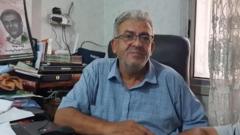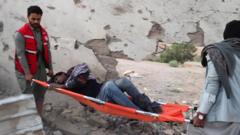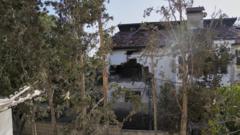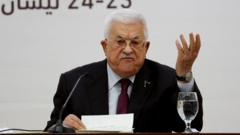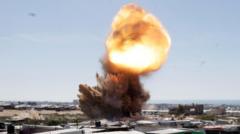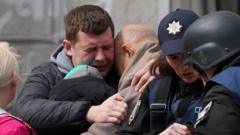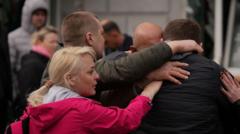The closure affects hundreds of Palestinian students and raises serious concerns regarding their right to education.
Israeli Forces Shut Down UN Schools in East Jerusalem Amid Rising Tensions

Israeli Forces Shut Down UN Schools in East Jerusalem Amid Rising Tensions
In a controversial move, Israeli authorities close UN-run schools in East Jerusalem, prompting strong international backlash.
Armed Israeli security forces have forcibly closed three schools operated by the United Nations Relief and Works Agency for Palestine Refugees (UNRWA) in East Jerusalem's Shuafat refugee camp, sending hundreds of Palestinian students home soon after classes commenced Thursday morning.
Philippe Lazzarini, the Commissioner-General of UNRWA, condemned the closures, accusing Israeli authorities of violating children's basic educational rights and showing a "blatant disregard of international law." Tensions have escalated since an Israeli ban on UNRWA, instituted earlier this year amid claims that the agency is infiltrated by Hamas, a claim UNRWA has strongly denied.
Videos from the scene captured students in uniform embracing one another outside the schools as Israeli forces arrived. A closure order affixed to one school warned of prohibitions against educational activities and the presence of students or staff. UNRWA reported over 550 children aged six to 15 were present at the time, with one staff member detained, marking a distressing incident for children who now face barriers to their education.
Israeli police were also seen at three additional schools in East Jerusalem, effectively halting educational activities there as well. Lazzarini publically denounced the actions, asserting that "storming schools and forcing them shut is a blatant disregard of international law." He called for UNRWA schools to remain operational to protect an entire generation's educational prospects.
The Palestinian Authority deemed the closures a violation of children's rights, while international diplomatic representatives, including the British consulate in Jerusalem, condemned the actions of Israeli authorities. They expressed solidarity with affected students, parents, and educators.
UNRWA has been working in East Jerusalem since 1950 under a mandate from the UN General Assembly, and international law obligates Israel to support the operations of institutions dedicated to children's education. Last year, Israeli lawmakers enacted regulations barring contact between officials and UNRWA, as well as restricting the agency's activities in Israeli-controlled areas.
The geopolitical landscape remains complex, as Israel captured East Jerusalem, and the broader West Bank during the 1967 Middle East war, later annexing East Jerusalem in 1980—a move largely unrecognized globally. Palestinian aspirations for East Jerusalem to serve as the capital of their future state further amplify the tensions, compounded by the presence of approximately 230,000 Israeli settlers living alongside 390,000 Palestinians in the area.
Despite widespread international consensus deeming Israeli settlements in East Jerusalem and elsewhere in the West Bank illegal under international law, Israel continues to dispute this position.
Philippe Lazzarini, the Commissioner-General of UNRWA, condemned the closures, accusing Israeli authorities of violating children's basic educational rights and showing a "blatant disregard of international law." Tensions have escalated since an Israeli ban on UNRWA, instituted earlier this year amid claims that the agency is infiltrated by Hamas, a claim UNRWA has strongly denied.
Videos from the scene captured students in uniform embracing one another outside the schools as Israeli forces arrived. A closure order affixed to one school warned of prohibitions against educational activities and the presence of students or staff. UNRWA reported over 550 children aged six to 15 were present at the time, with one staff member detained, marking a distressing incident for children who now face barriers to their education.
Israeli police were also seen at three additional schools in East Jerusalem, effectively halting educational activities there as well. Lazzarini publically denounced the actions, asserting that "storming schools and forcing them shut is a blatant disregard of international law." He called for UNRWA schools to remain operational to protect an entire generation's educational prospects.
The Palestinian Authority deemed the closures a violation of children's rights, while international diplomatic representatives, including the British consulate in Jerusalem, condemned the actions of Israeli authorities. They expressed solidarity with affected students, parents, and educators.
UNRWA has been working in East Jerusalem since 1950 under a mandate from the UN General Assembly, and international law obligates Israel to support the operations of institutions dedicated to children's education. Last year, Israeli lawmakers enacted regulations barring contact between officials and UNRWA, as well as restricting the agency's activities in Israeli-controlled areas.
The geopolitical landscape remains complex, as Israel captured East Jerusalem, and the broader West Bank during the 1967 Middle East war, later annexing East Jerusalem in 1980—a move largely unrecognized globally. Palestinian aspirations for East Jerusalem to serve as the capital of their future state further amplify the tensions, compounded by the presence of approximately 230,000 Israeli settlers living alongside 390,000 Palestinians in the area.
Despite widespread international consensus deeming Israeli settlements in East Jerusalem and elsewhere in the West Bank illegal under international law, Israel continues to dispute this position.






